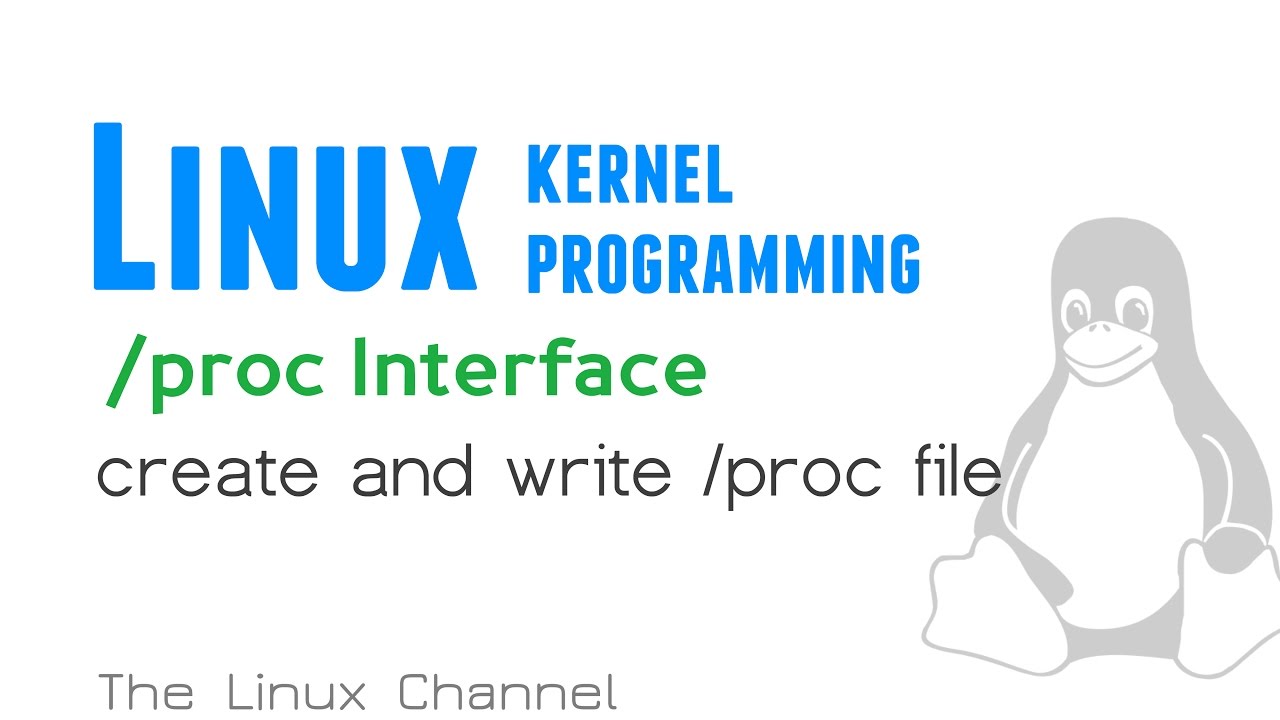/proc is one of the most popular kernel to user-space interface which you can leverage to add an interface to your Kernel code such as Kernel modules, Kernel Device Drivers, etc. Personally I prefer /proc interface than other alternatives such as /sysfs, ioctl() and so on for my personal Kernel modules/stack.
So here is my detailed multi-episode YouTube video series on /proc Interface.
Download this episode my entire kernel module sample code, make file, clean script which I hosted in my GitHub Repo. And here is the source code for a quick reference.
/* proc_example.c - write /proc file
* Author: Kiran Kankipati
* Updated: 23-feb-2017
*/
#include <linux/kernel.h>
#include <linux/types.h>
#include <linux/module.h>
#include <linux/errno.h>
#include <linux/slab.h>
#include <linux/netfilter.h>
#include <linux/netfilter_ipv4.h>
#include <linux/skbuff.h>
#include <linux/udp.h>
#include <linux/ip.h>
#include <linux/in.h>
#include <linux/string.h>
#include <linux/init.h>
#include <linux/net.h>
#include <linux/netdevice.h>
#include <linux/socket.h>
#include <linux/sockios.h>
#include <linux/inet.h>
#include <linux/inetdevice.h>
#include <linux/netdevice.h>
#include <linux/etherdevice.h>
#include <linux/if_arp.h>
#include <linux/icmp.h>
#include <linux/proc_fs.h>
#include <linux/netlink.h>
#include <linux/mroute.h>
#include <net/checksum.h>
#include <net/inet_ecn.h>
#include <net/xfrm.h>
#include <net/route.h>
#include <net/sock.h>
#include <net/ip.h>
#include <net/tcp.h>
#include <net/arp.h>
#include <net/udp.h>
#include <net/icmp.h>
#include <net/inetpeer.h>
#include <net/protocol.h>
#include <net/flow.h>
#include <asm/types.h>
struct proc_dir_entry *tlc_proc_a;
int abc=100;
#define PROCFS_MAX_SIZE 30
char proc_buf[PROCFS_MAX_SIZE];
static ssize_t tlc_proc_a_write(struct file *fp, const char *buf, size_t len, loff_t * off)
{ if(len > PROCFS_MAX_SIZE) { return -EFAULT; }
if(copy_from_user(proc_buf, buf, len)) { return -EFAULT; }
abc=simple_strtoul(proc_buf,NULL,10);
return len;
}
static ssize_t tlc_proc_a_read(struct file *fp, char *buf, size_t len, loff_t * off)
{ static int finished=0; if(finished) {finished=0;return 0;} finished=1;
sprintf(buf, "abc: %d\n", abc);
return strlen(buf);
}
static struct file_operations tlc_proc_a_fops = { .owner=THIS_MODULE, .read=tlc_proc_a_read, .write=tlc_proc_a_write, };
static int hello_init(void)
{
tlc_proc_a = proc_create( "tlc_proc_a", 0666, NULL, &tlc_proc_a_fops);
if(tlc_proc_a==NULL) { printk(KERN_ALERT "Error: Could not initialize %s\n", "tlc_proc_a"); }
return 0;
}
static void hello_exit(void)
{ remove_proc_entry("tlc_proc_a", NULL);
}
module_init(hello_init);
module_exit(hello_exit);
Its makefile:
obj-m += proc_example.o
all:
make -C /lib/modules/$(shell uname -r)/build M=$(PWD) modulesI also conduct sessions/classes on Systems and Network Software Programming, Linux Kernel Programming and Architecture. If you are interested, click HERE for more details.
If you have any queries or anything to discuss further on Linux Kernel Programming and writing Kernel modules kindly feel free to contact me.
